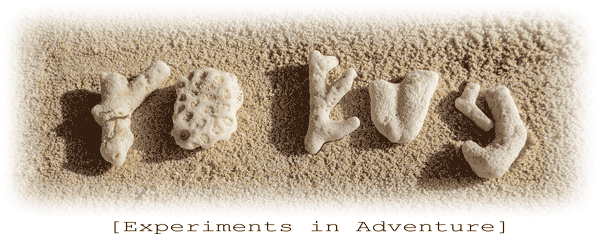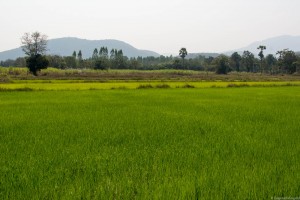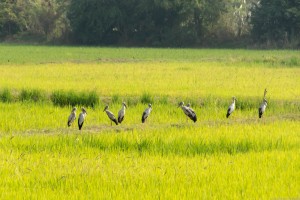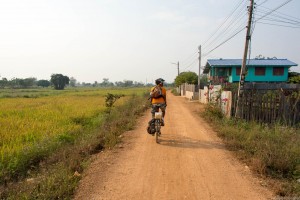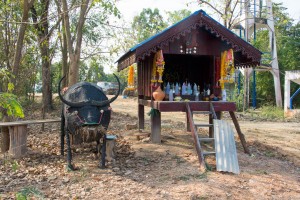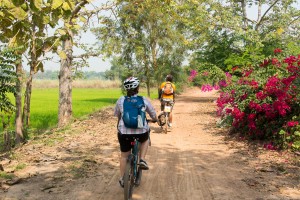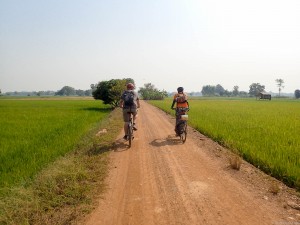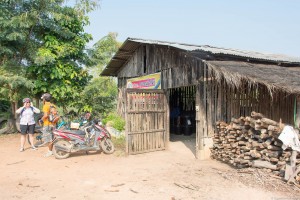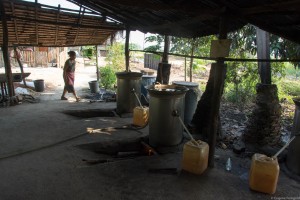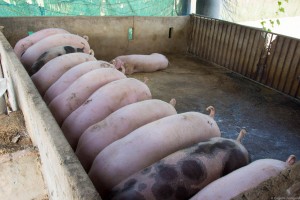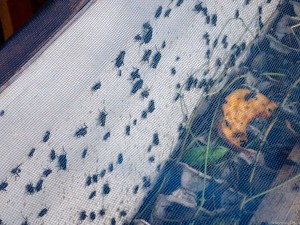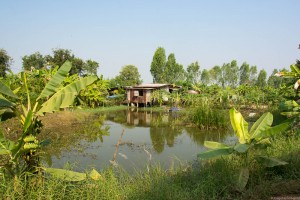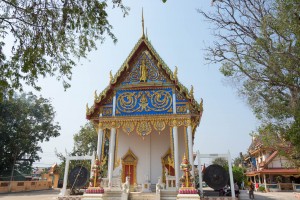As we had gotten our fill of ruins in the Historic City of Suhkothai, we decided to take a bike tour of the area—one of the few other things listed to do that didn’t involve more ruins. The company we went with is one of two in the city and is run by a very nice Thai family. Jib, the husband, was our guide and we were set up with much better bikes than we’d had the previous day which made the 30 km ride much more pleasant.
Much of the tour involved riding through rice fields and small villages. Jib told us all about the old traditions of growing rice as well as newer methods (including the widespread use of pesticides.) Interestingly, we learned that the large numbers of storks seen in the fields are there because there is a major problem with snails that eat rice and the storks eat the snails. They are completely awkward looking birds, but helpful!
- Rice paddy in Sukhothai
- Storks eat the snails that destroy rice crops. Better than pesticides!
- Our guide on the roads through rice fields
We also learned a great deal about the people who live and work in the farms and villages we passed through. Cock fighting is a major pastime in Thailand, and especially in the Sukhothai area and has been for many centuries. But “because they are Buddhist and peaceful” they usually make sure the lethal spurs on the roosters’ feet are cut-off or wrapped. I found this to be a bit contradictory as animals still die from the fights.
On the subject of the religion and belief of the people of the area (which is really a combination of Buddhism, Hinduism, and animism), we finally discovered more about the small shrines we have seen everywhere. The little house-like structures are spirit houses and are literally intended to be that, a place for the spirits of the dead to live so they don’t haunt you. Flowers, water, and food (though this is removed after 30 mins) are left daily as offerings. The spirit house we stopped at had been there for a few generations and was next to a tribute to Water Buffalo, an animal once vital to farming and now rarely present. The buffalo was made of shade cloth and motor bike tires and would not be out of place at Burning Man.
- Village shrine and buffalo
- Rochelle on her bike
- Eugene on his!
With so many kilometers of rice fields, I had a lot of time to contemplate the idea of sustainability in terms of life in the rural parts of Thailand. We visited a family who runs a rice whiskey distillery. In some ways they truly represent “sustainability,” but mainly as a way to scrape by. They grow the rice organically, raise the yeast used to ferment to rice into wine, which they then distill into whiskey. The solid leftovers from the process are dried and fed to pigs that can then be sold. The stills are heated over wood fires, the coals of which are sold to food cart vendors to use in their grills. To sell the whiskey legally, the family is required to buy a 28 baht government stamp per bottle that they then sell for 35 baht (1 USD = 32 baht). Not surprisingly, much of her business is done “un-officially”. Given the insanely small margin they live on, the idea of any kind of waste would be absurd.
Another fascinating place we visited was a family that raises crickets, currently trendy in the sustainable food movement. Farmers used to collect crickets in traps in the fields, but with the increased use of insecticides, they are no longer able to catch many. So now, there are people who raise them to sell. Crickets don’t seem to require much, they eat the vegetable waste that humans don’t and reproduce and grow quickly. Our guide also raises crickets, which his daughter apparently eats like potato chips. He had his uncle make us a batch for the end of our ride: pan fried, salted, and quite tasty.
- Visiting a rice whiskey distillery
- Rice whiskey stills and the woman who runs them
- Leftovers from making rice whiskey go to feeding the pigs
- Cricket farming, sustainable and quite tasty
- Farm in Sukhothai
- Local village wat in Sukhothai, complete with large gongs.
Finally, no Thai countryside tour would be complete without a healthy dose of wats, and we saw a number – some still being constructed, some large with many monks. It is surprising that even though they are mostly poor farmers, almost every village funds a wat and monks. Eugene and I are intrigued by how much money is put into the religion here. The largest wat we visited on the tour, where there was a mummified monk on display, had a pair of special gongs that make a sound not just by hitting them, but also by rubbing them. See Eugene successfully stroke one till it sings 🙂
Overall, the tour was one of the most interesting experiences of our trip thus far. Jib was quite open about talking about the traditions and beliefs, but also the realities of modern Thailand (even a little politics). As in all agricultural places, the people who live in these villages and farms are getting older as the younger generation gets more education and leaves for the cities. It will be fascinating to see what rural life is like here in another 20 years.
